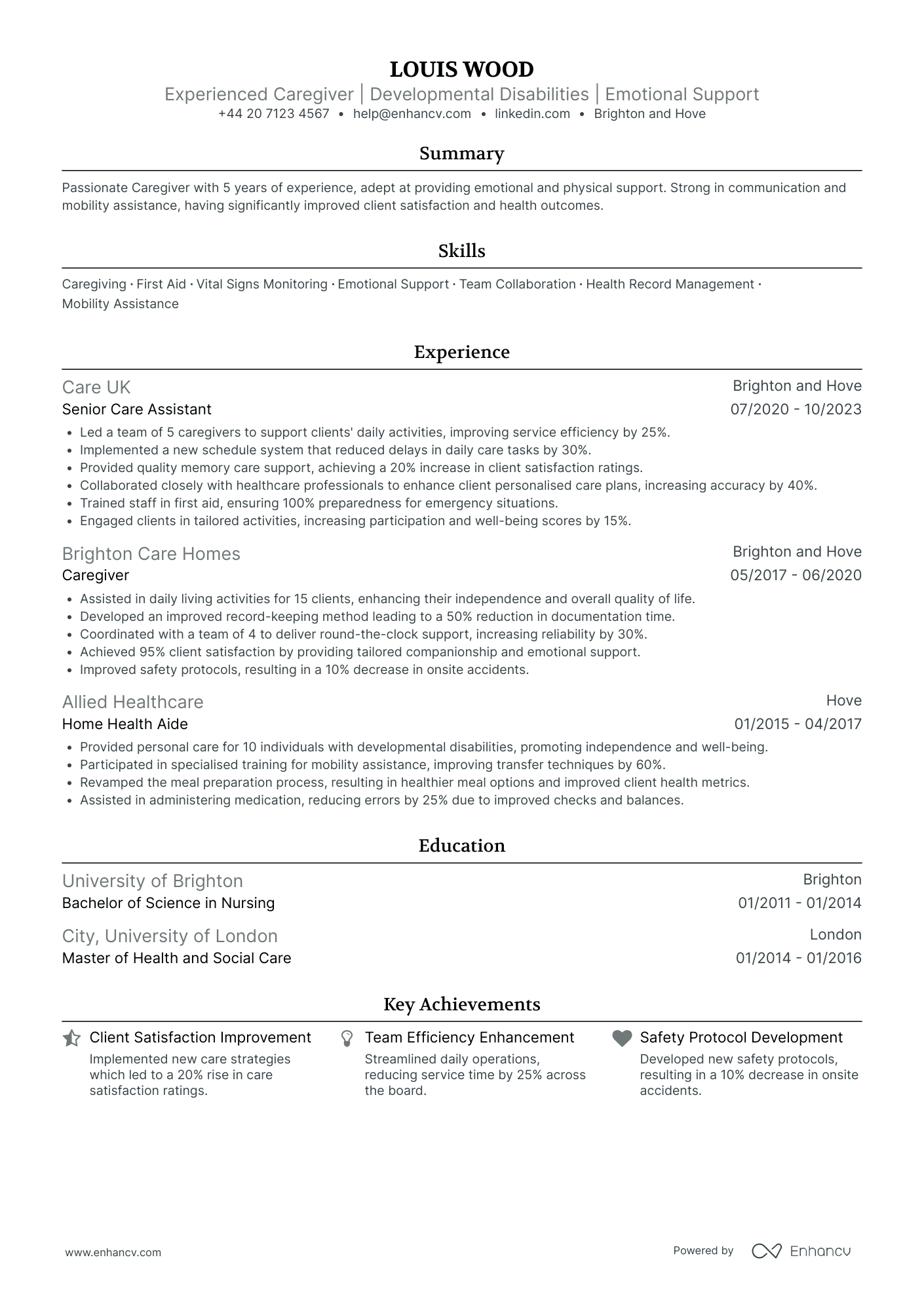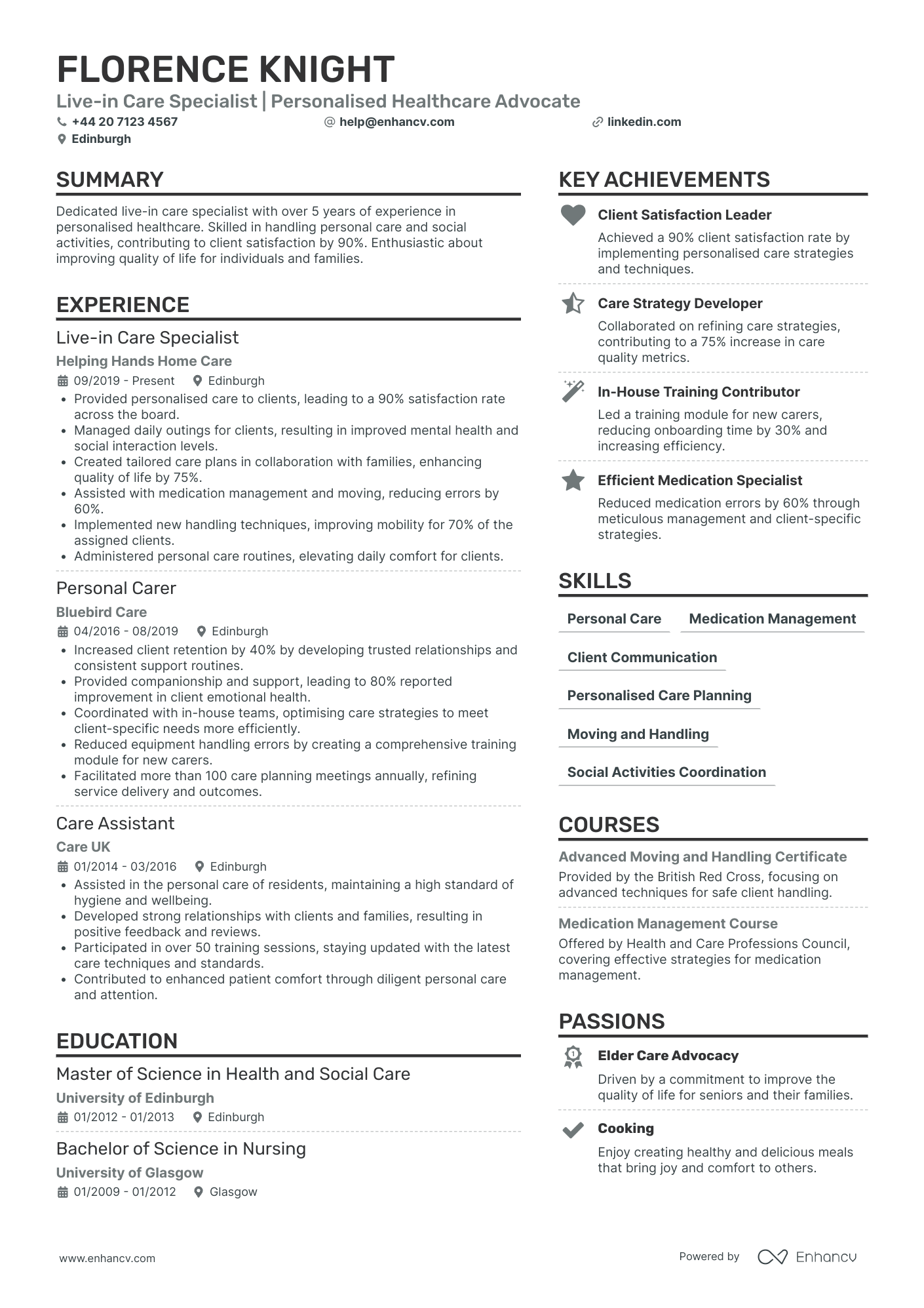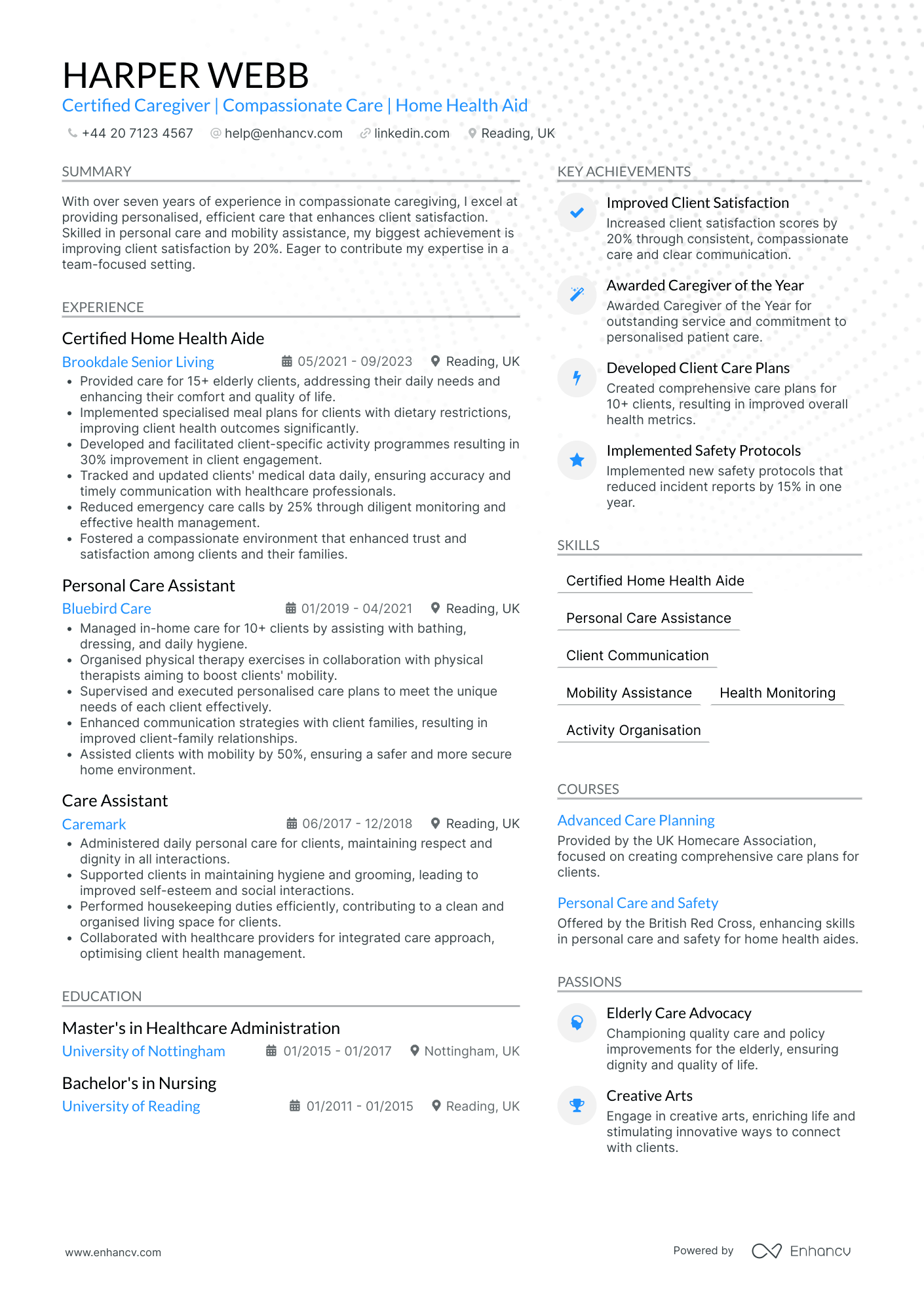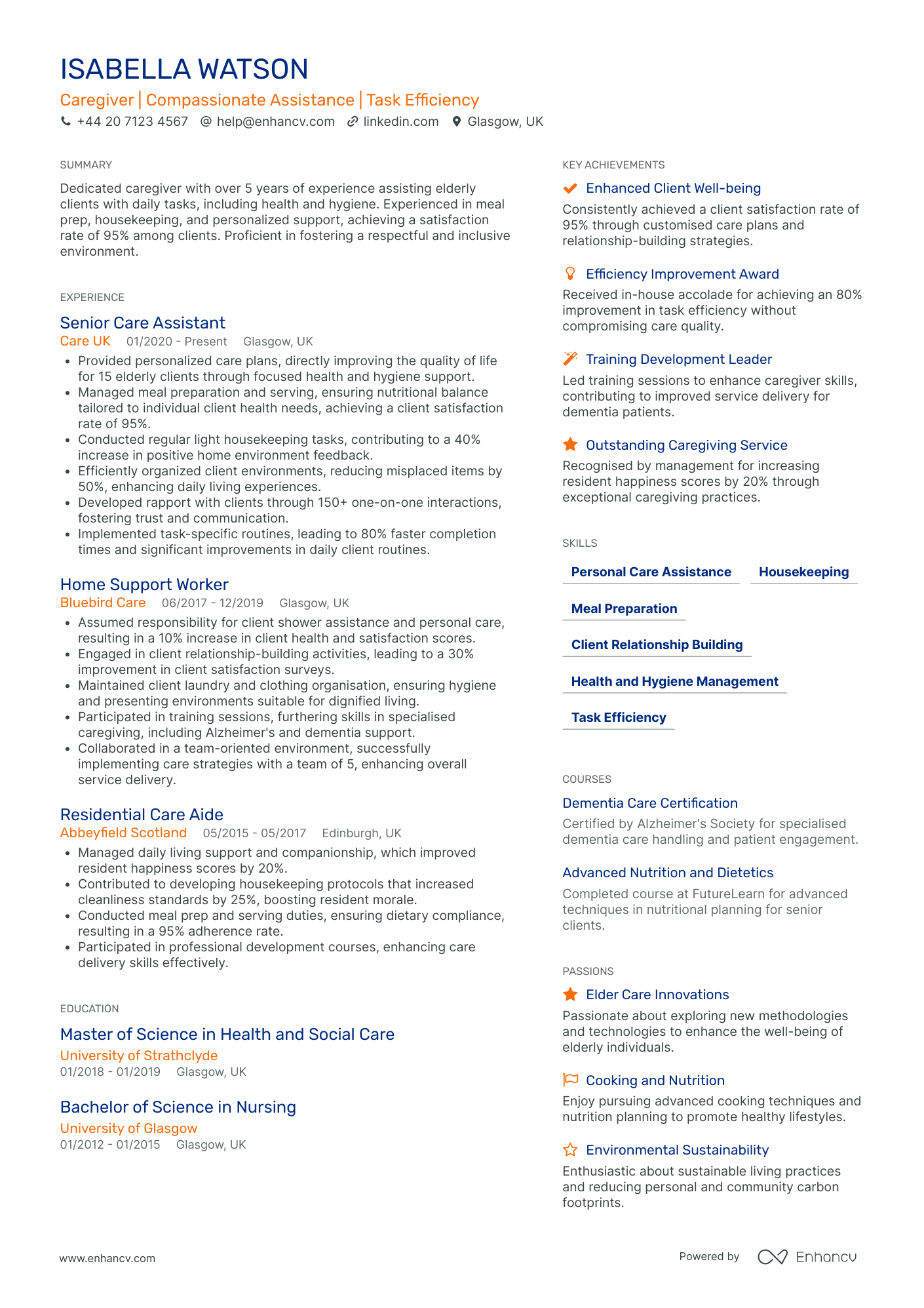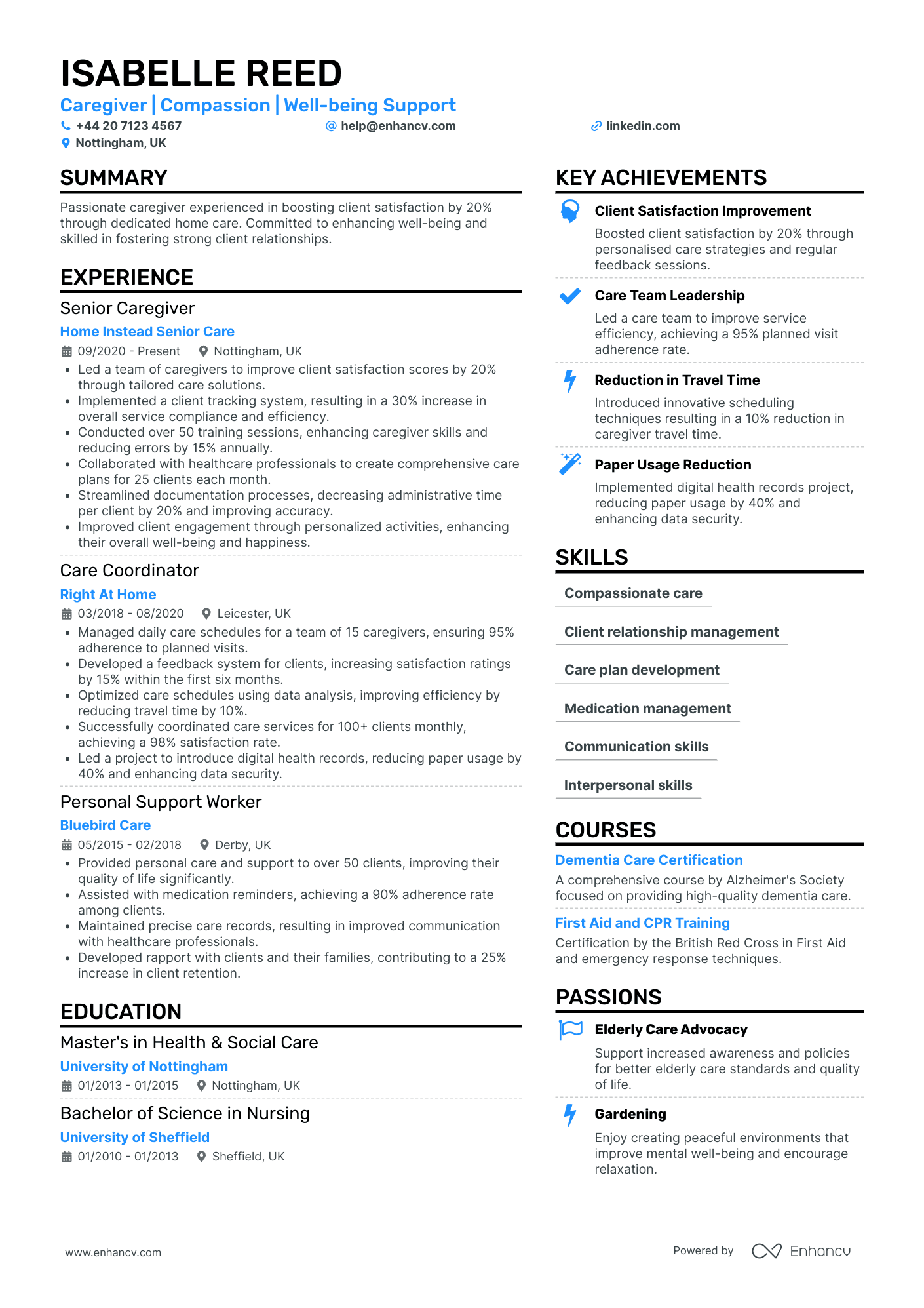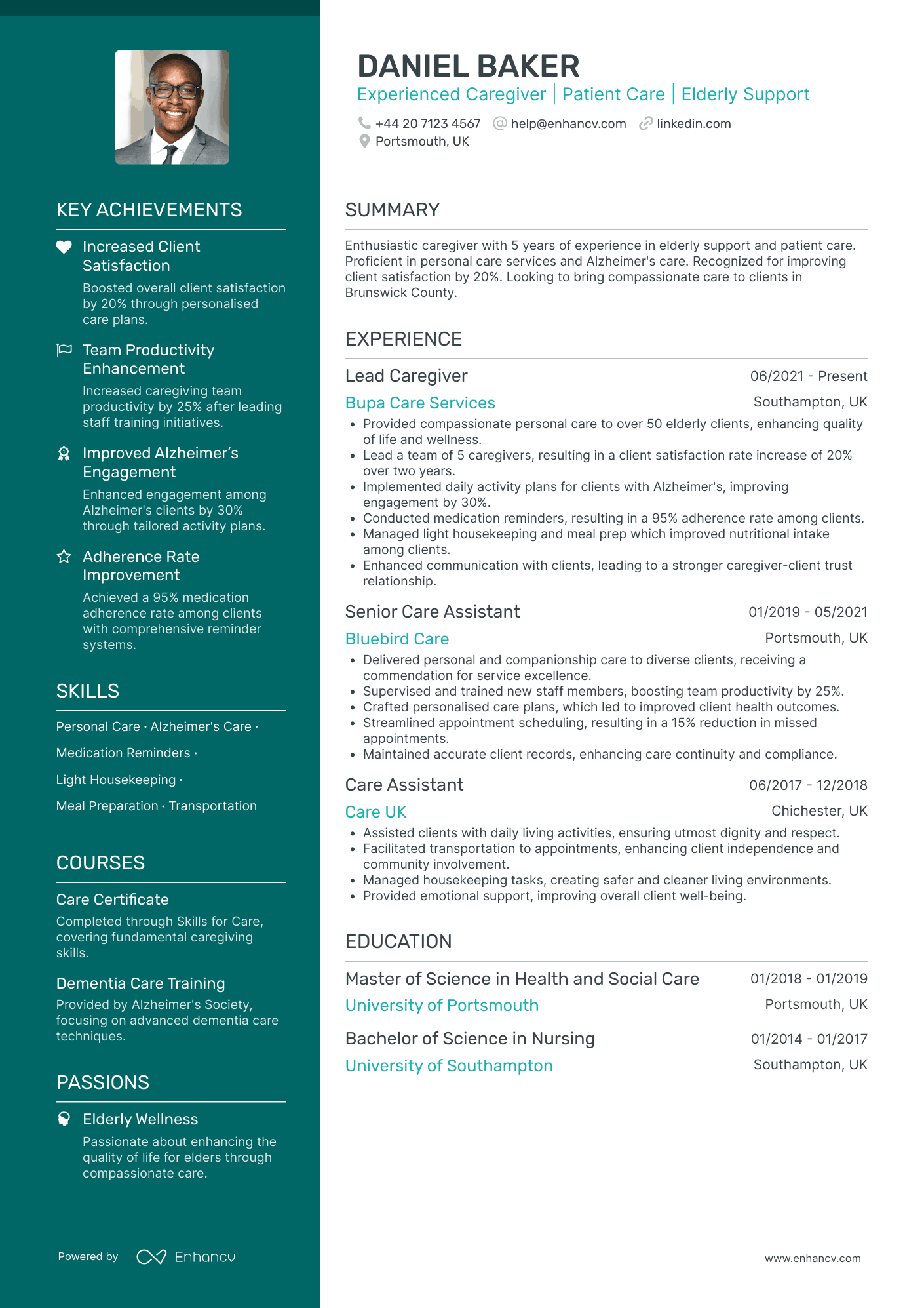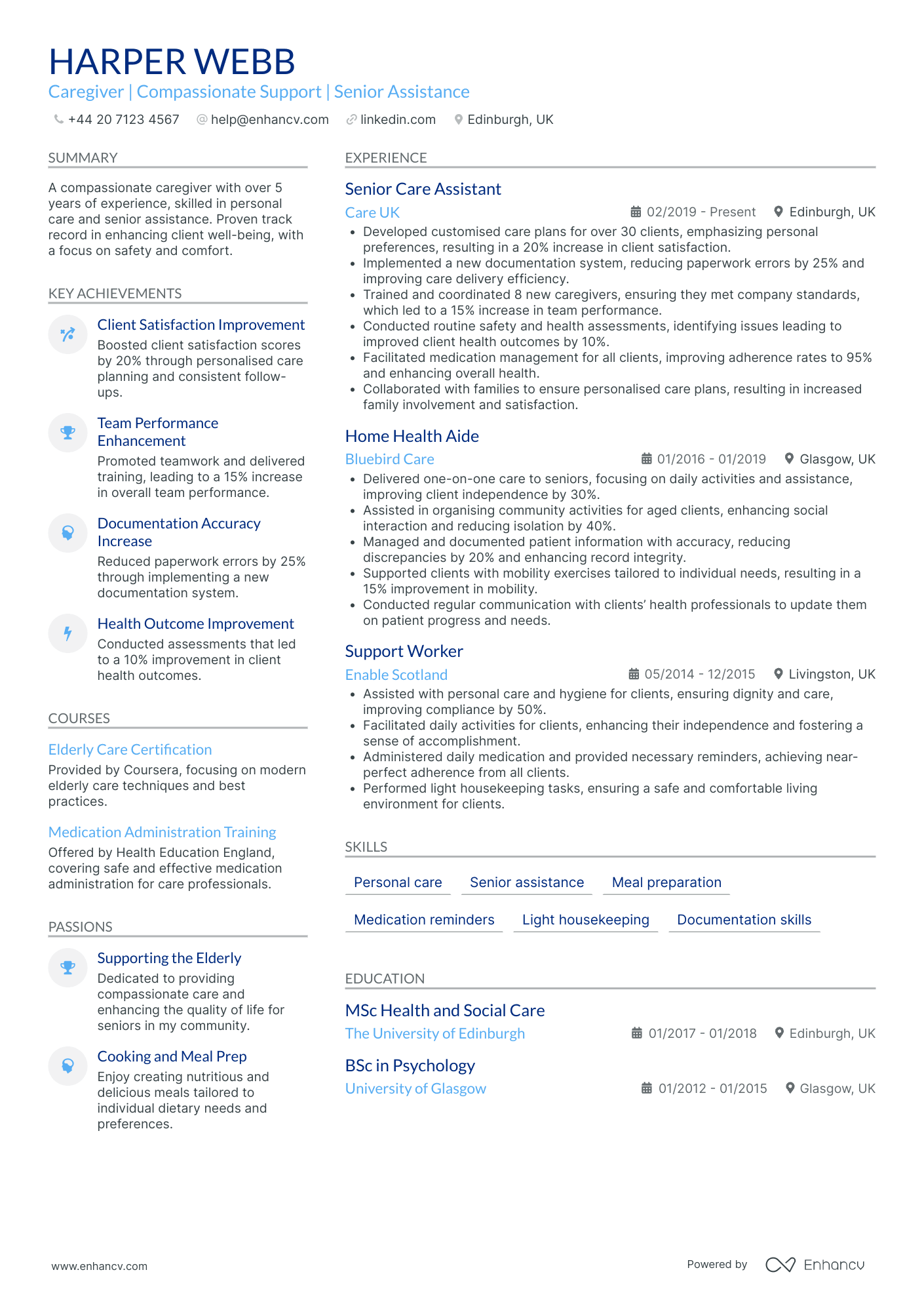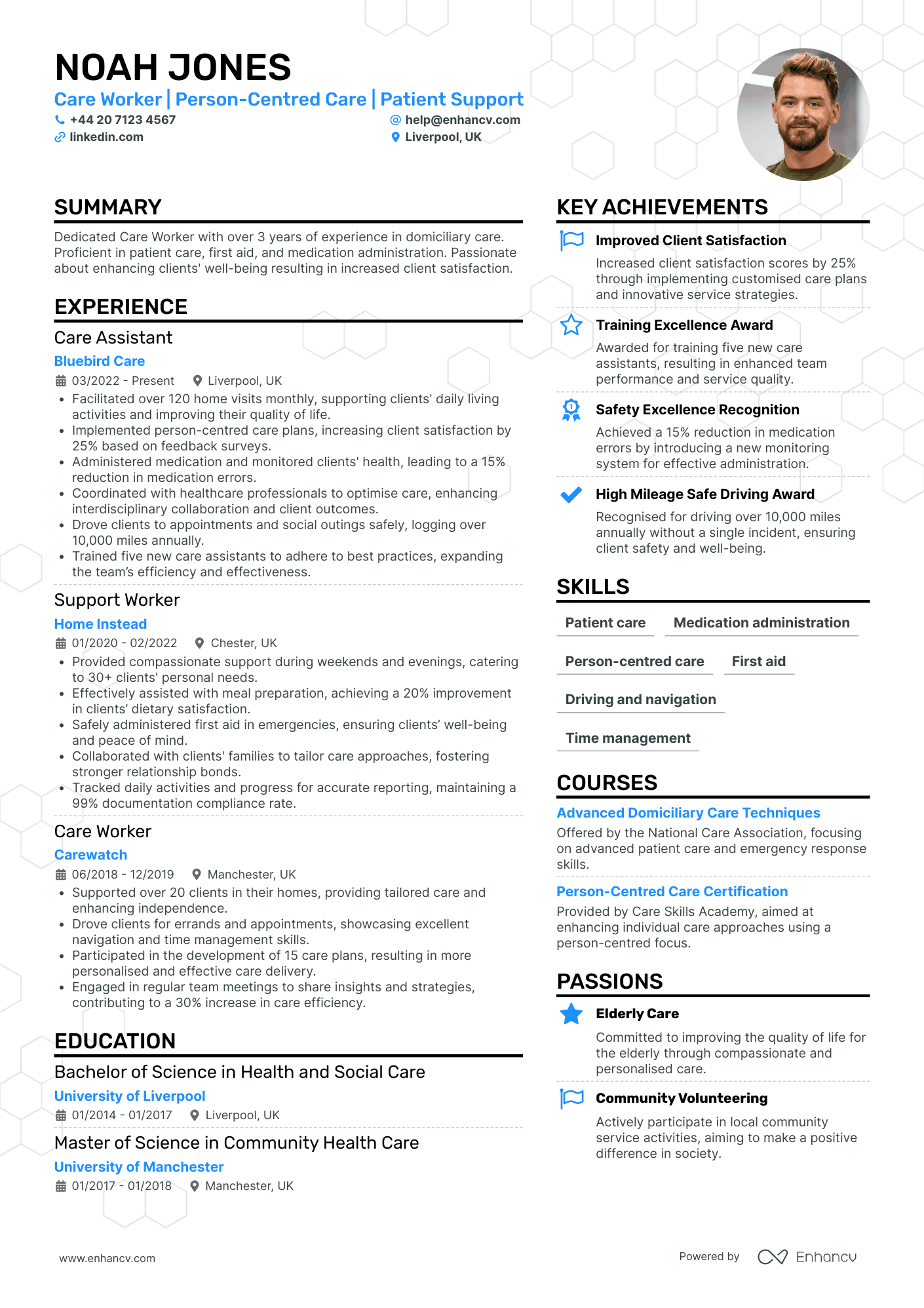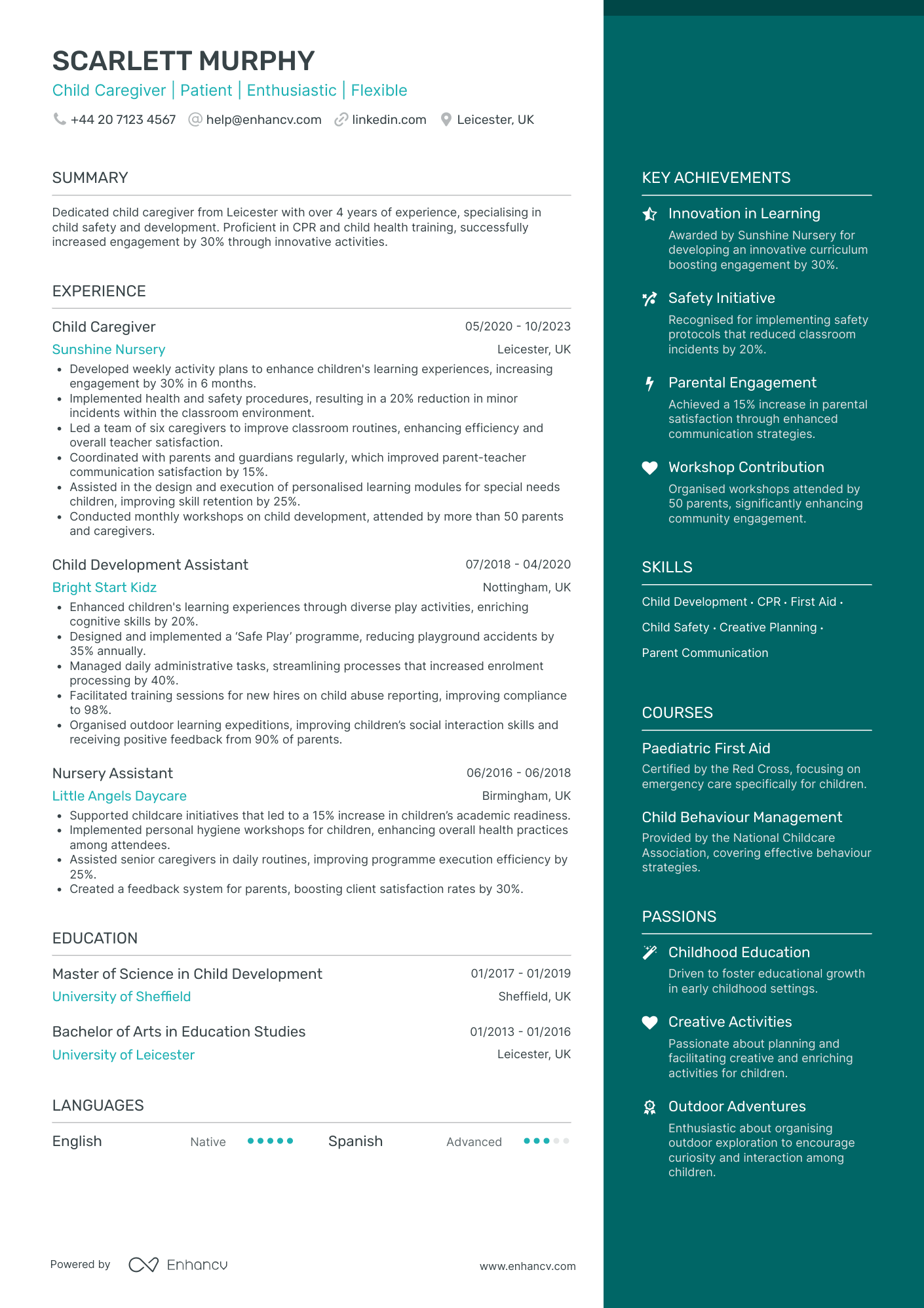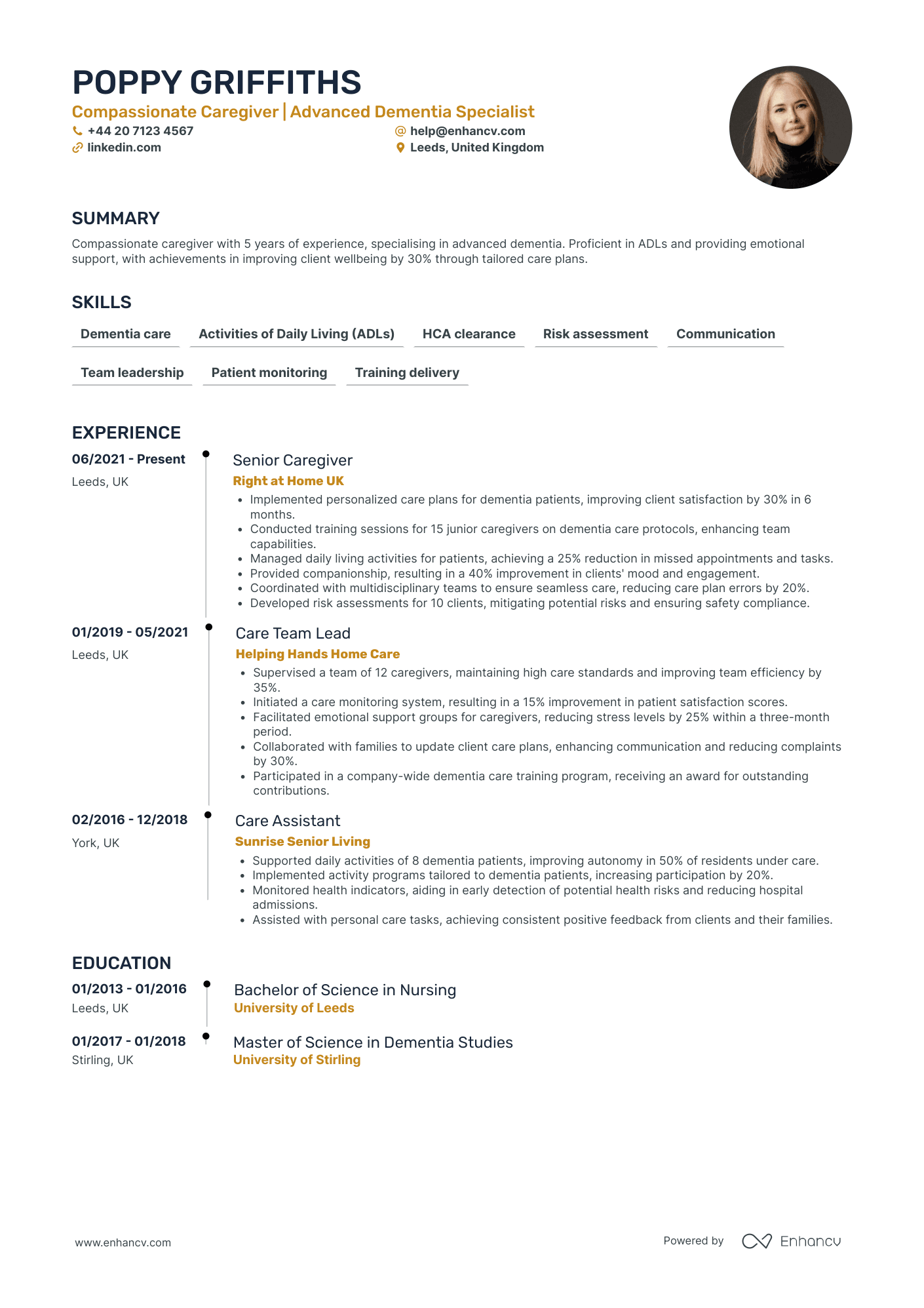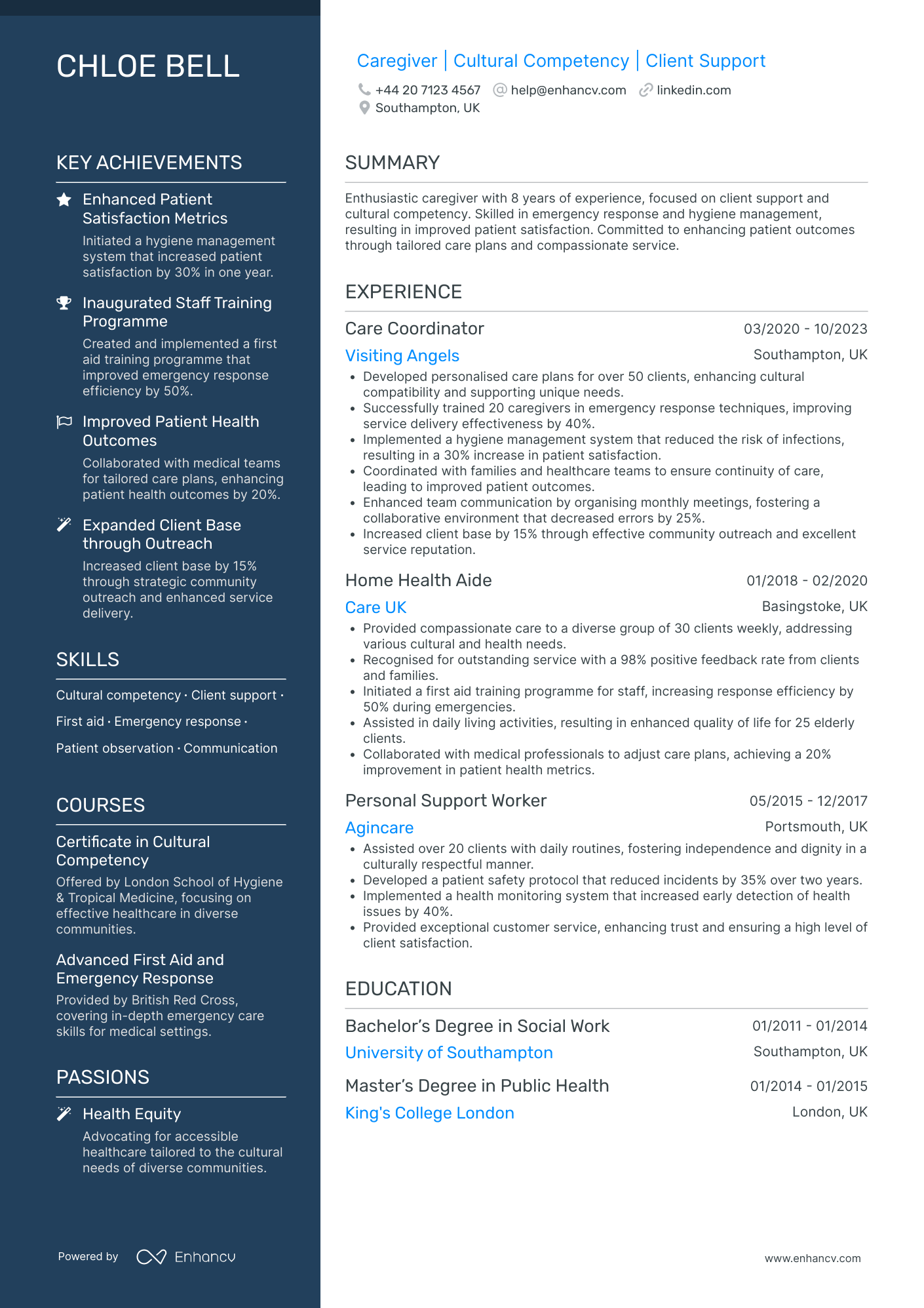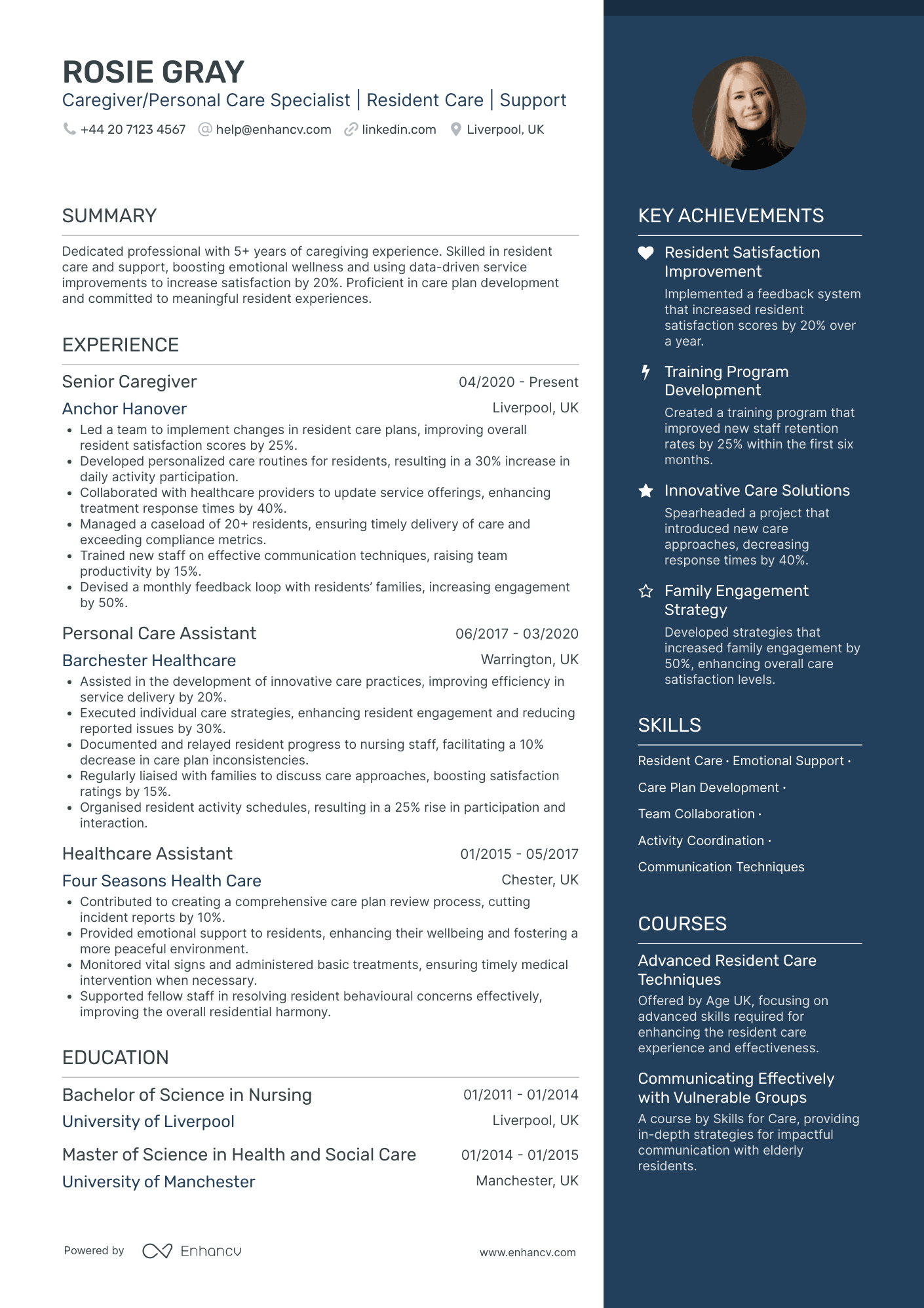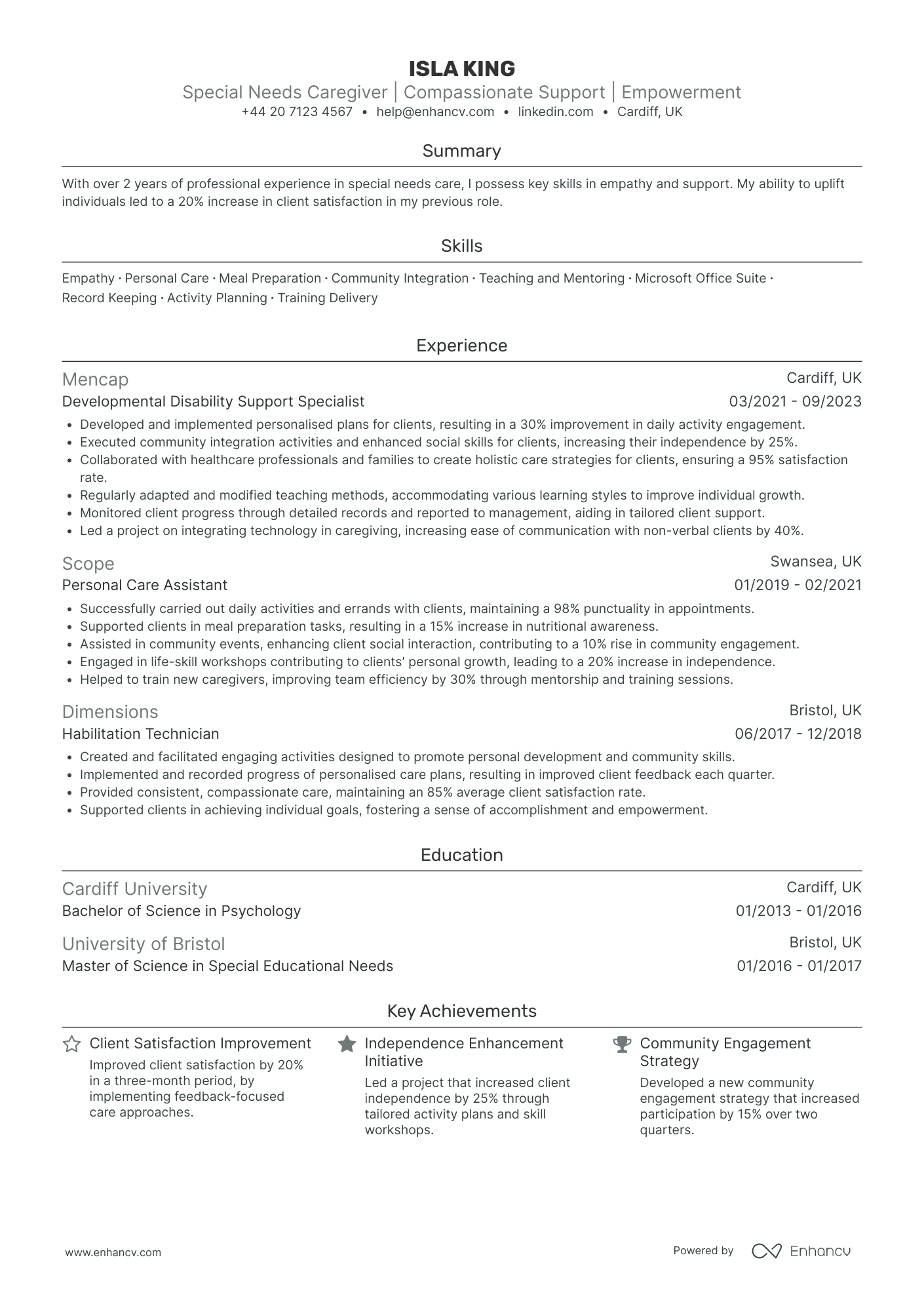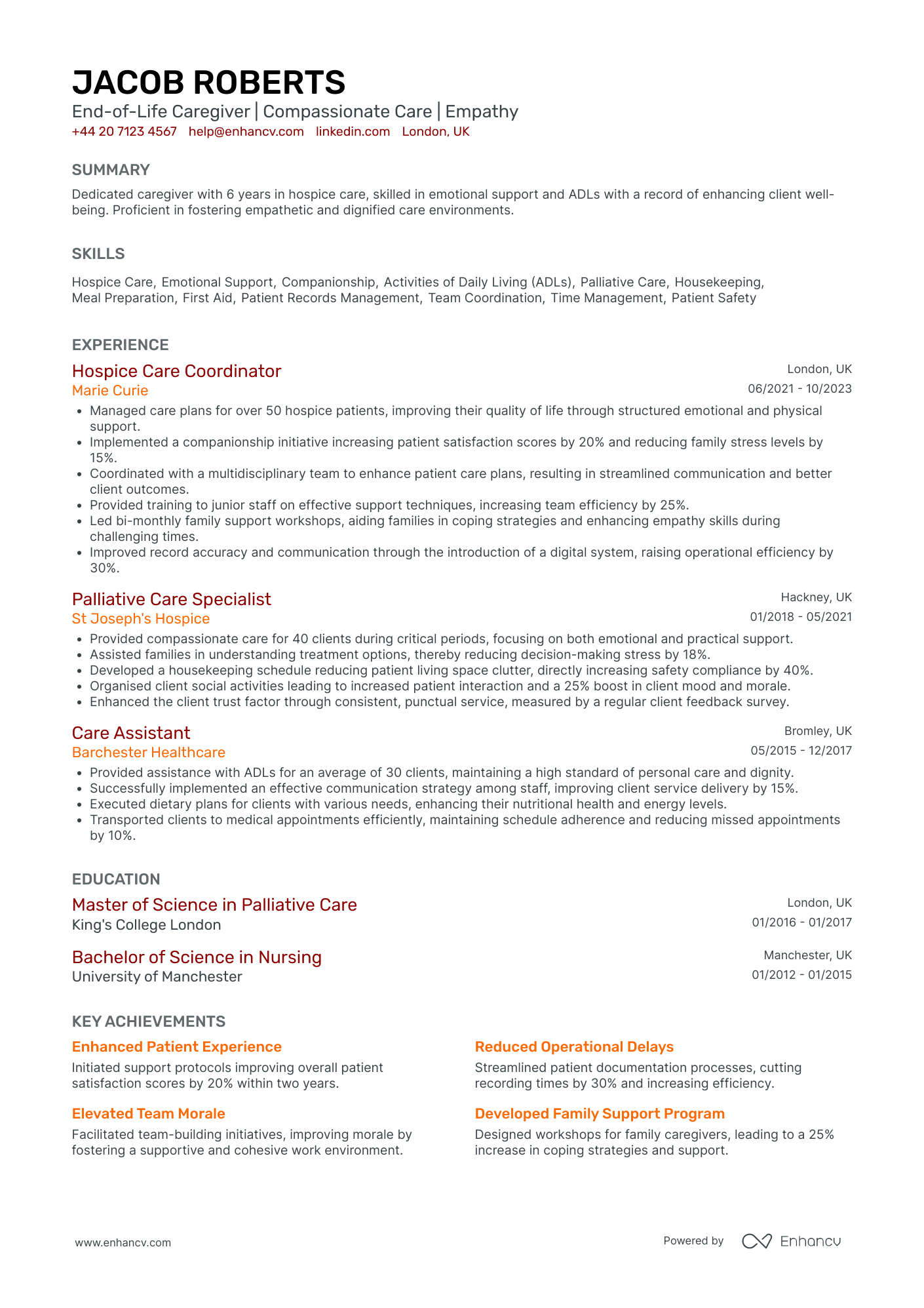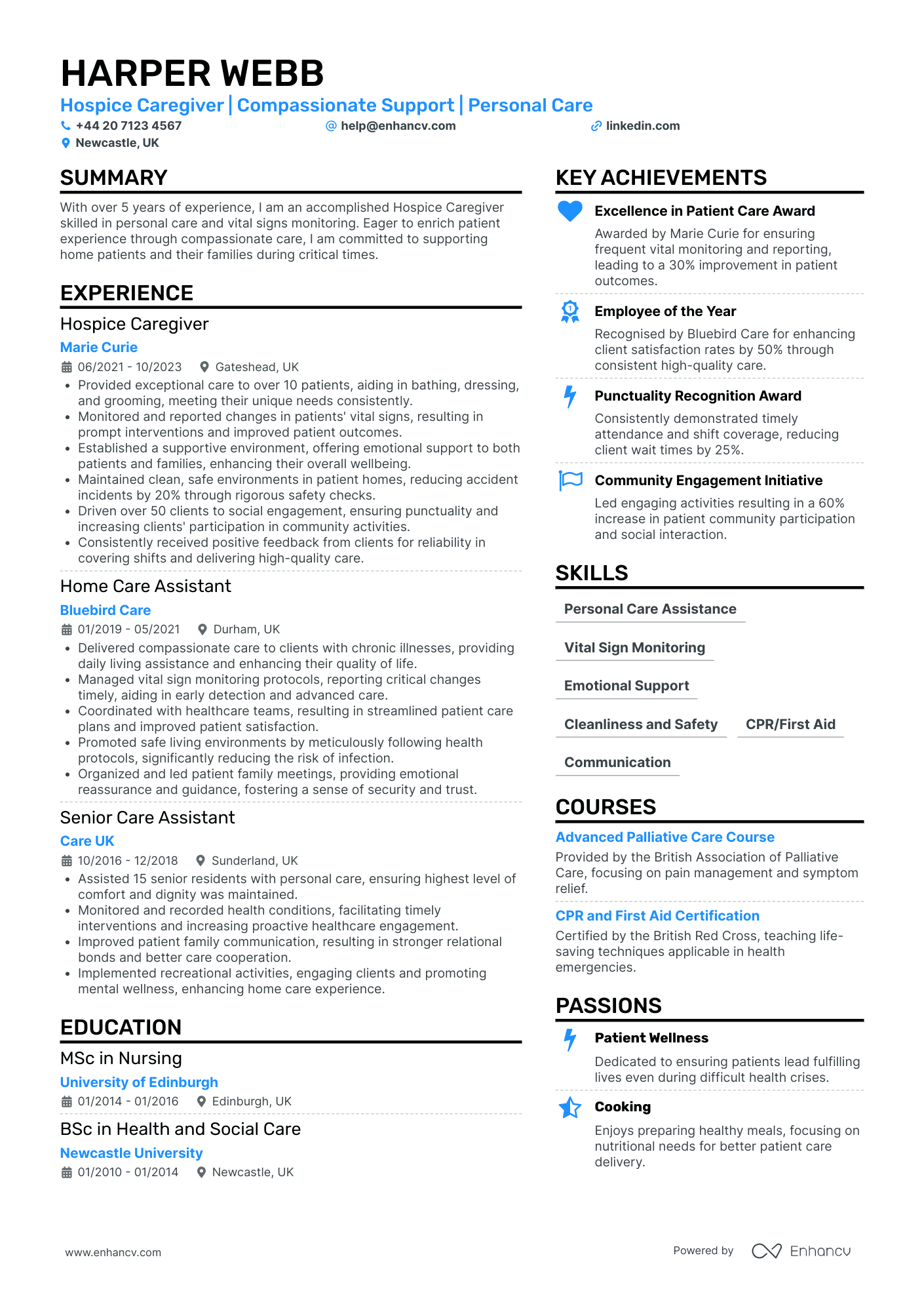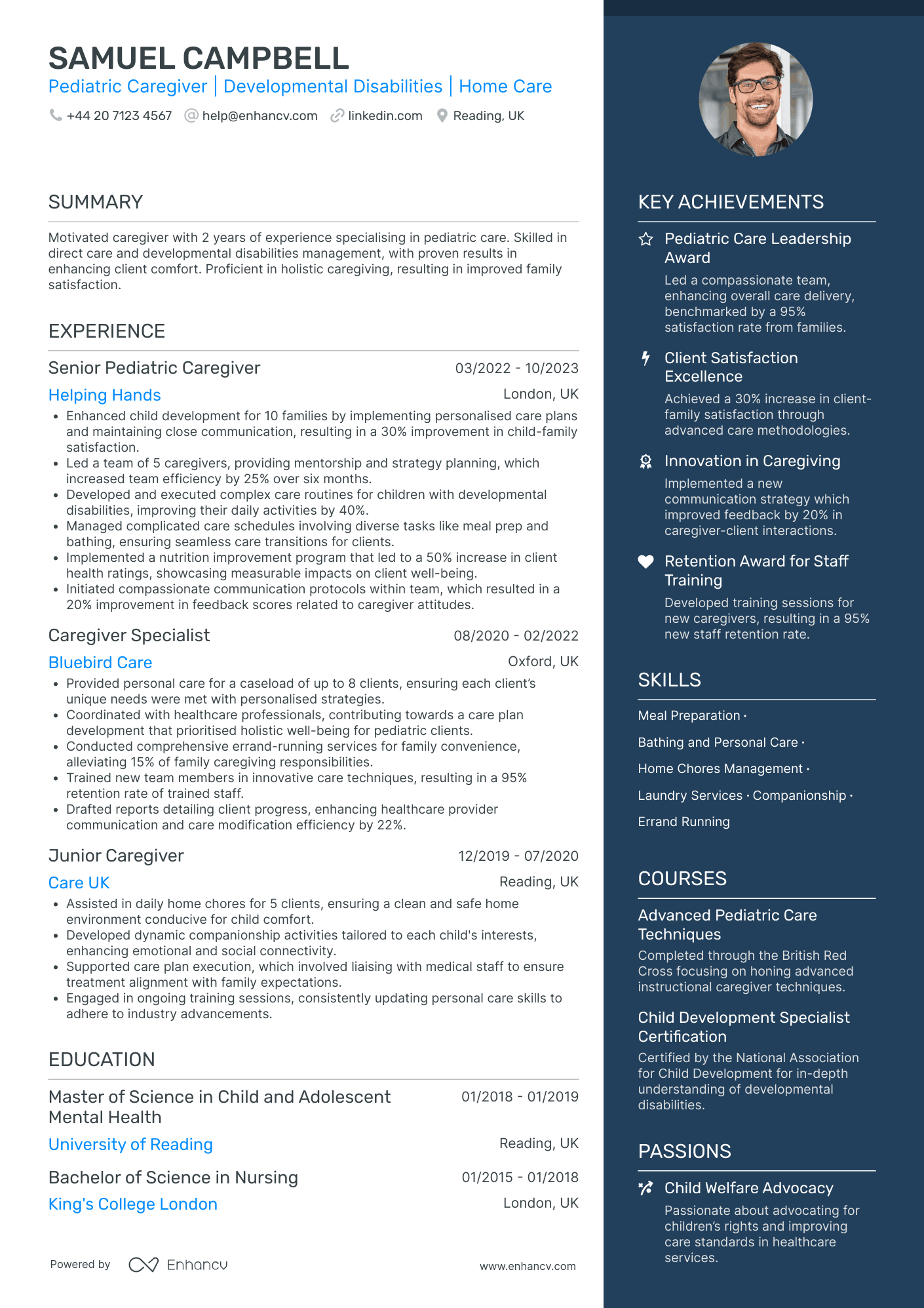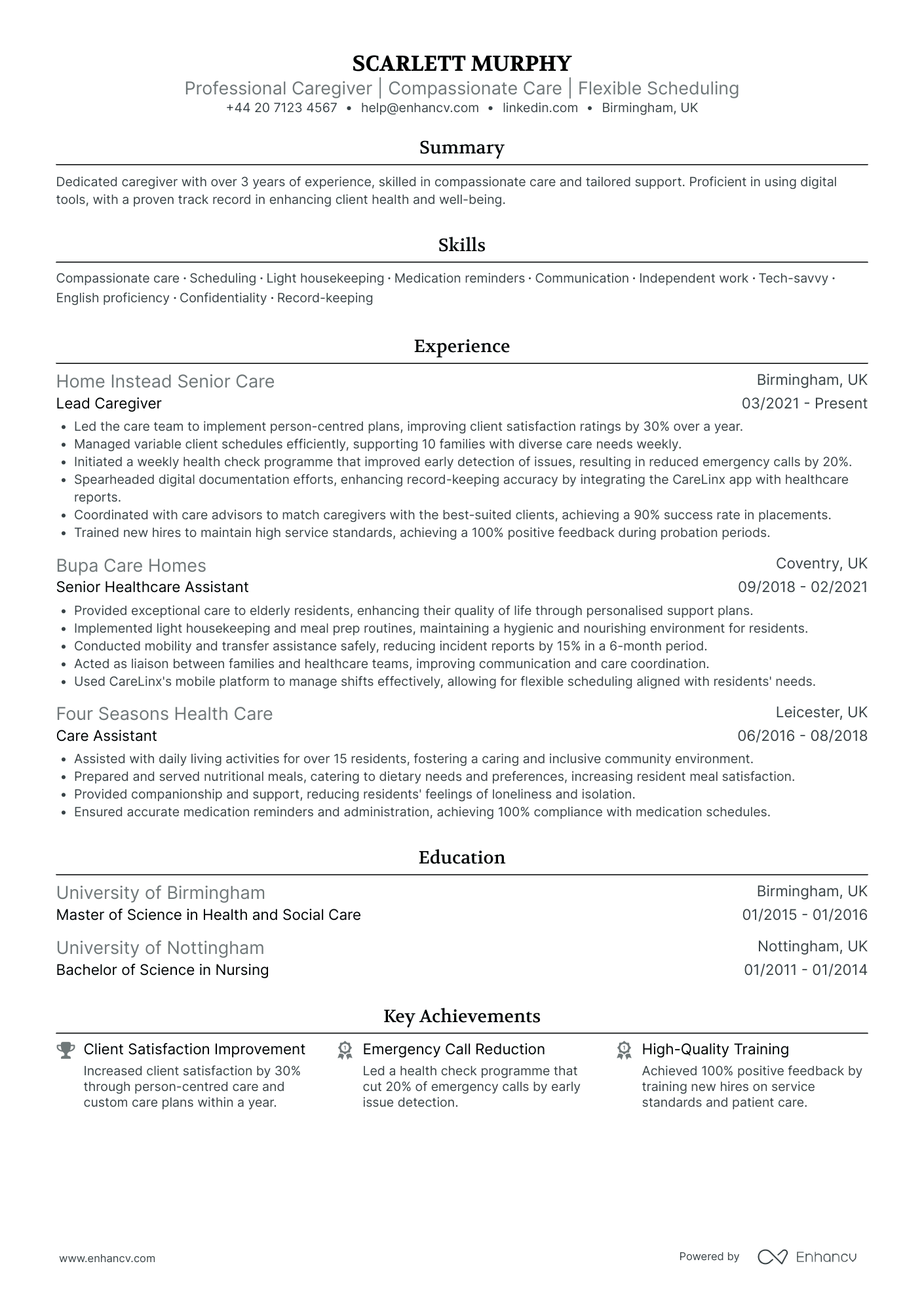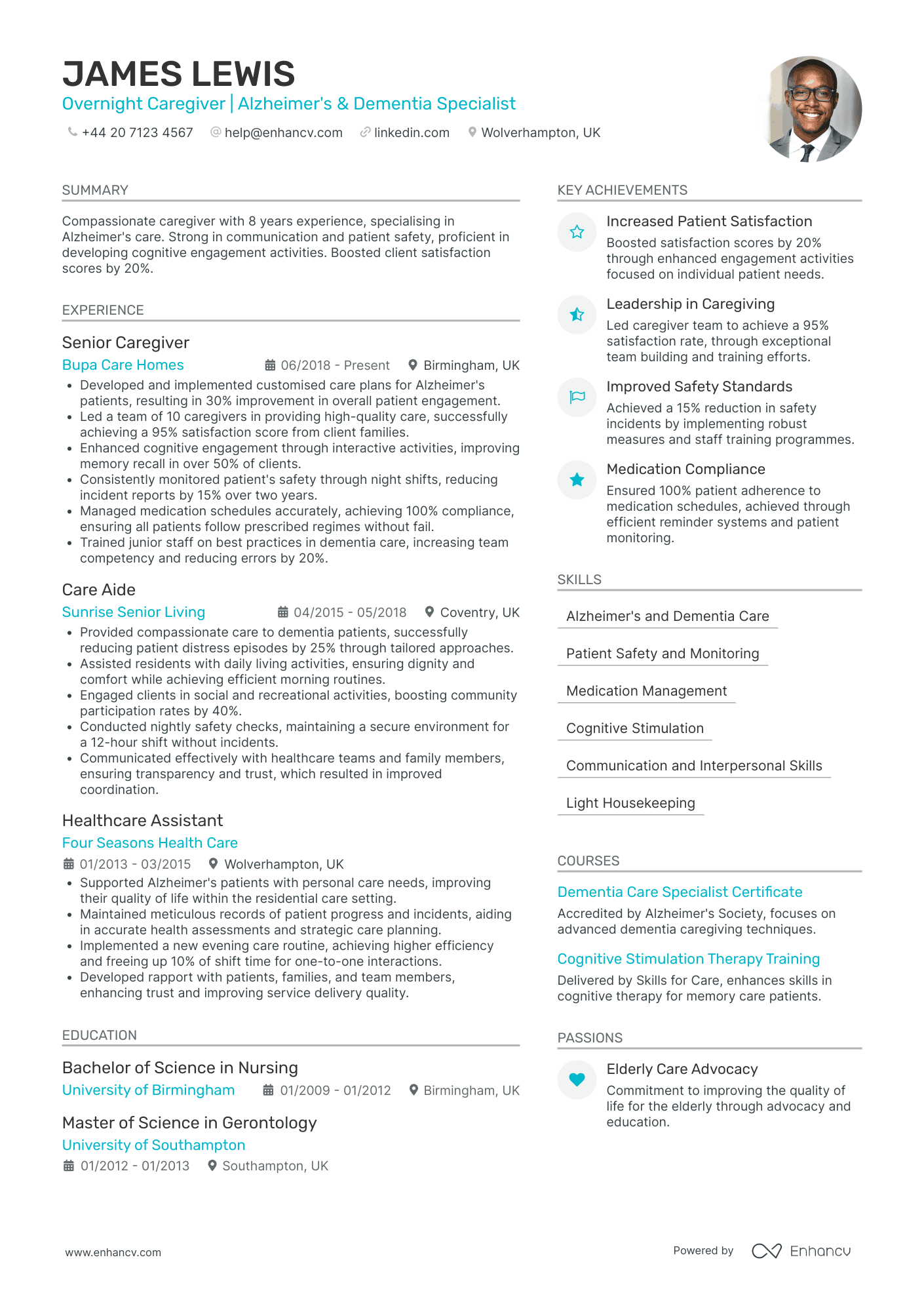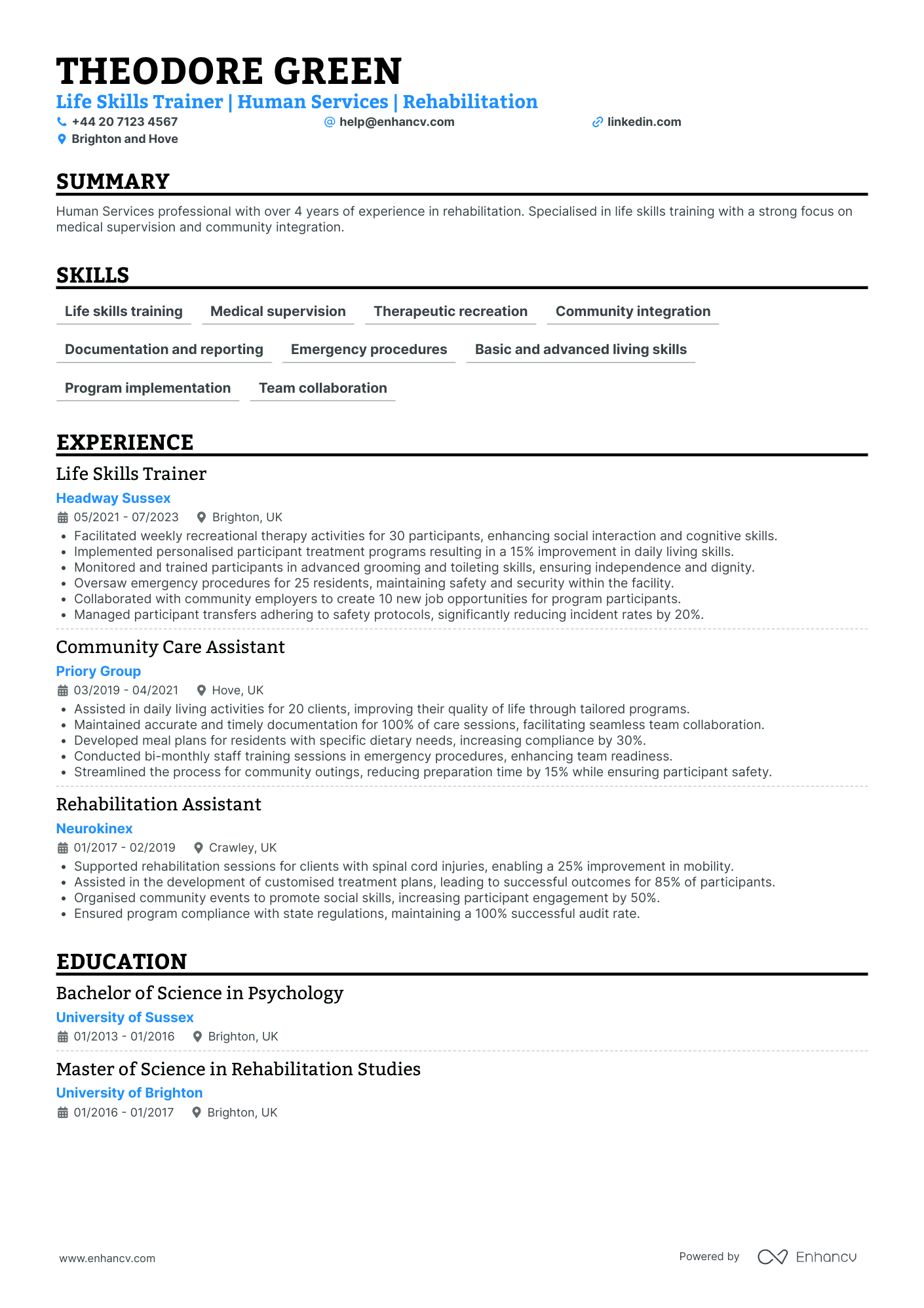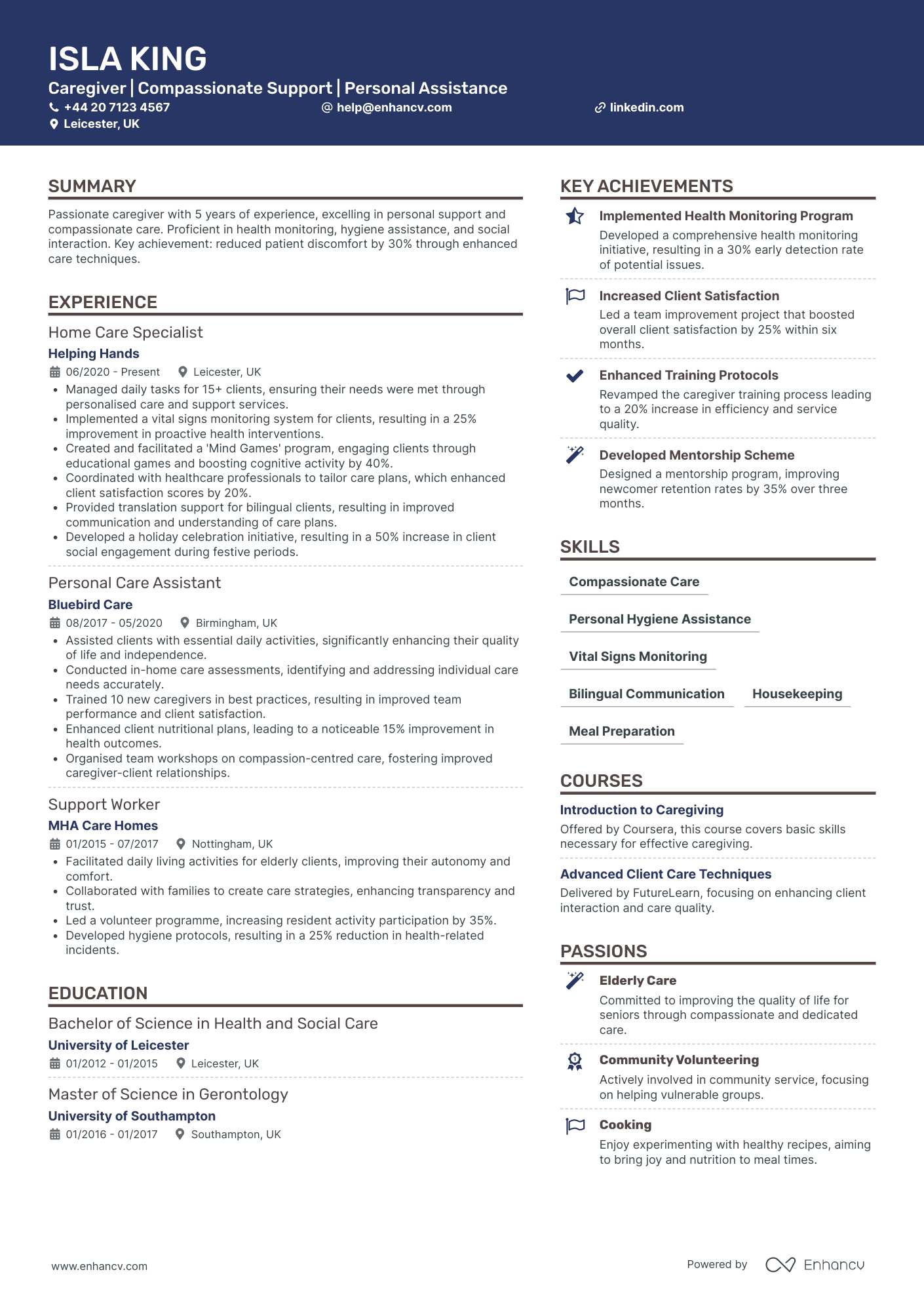Crafting your CV to adequately reflect the breadth of skills and emotional resilience you've developed as a caregiver can be an intricate challenge. Our guide offers targeted advice to help you articulate these competencies effectively, ensuring your application stands out to potential employers.
- Create an attention-grabbing header that integrates keywords and includes all vital information;
- Add strong action verbs and skills in your experience section, and get inspired by real-world professionals;
- List your education and relevant certification to fill in the gaps in your career history;
- Integrate both hard and soft skills all through your CV.
Discover more industry-specific guides to help you apply for any role in the links below:
CV examples for caregiver
By Experience
Senior Caregiver
- Structured Career Advancement - Louis Wood’s CV clearly outlines a progressive career trajectory within the caregiving industry. Starting as a Home Health Aide and advancing to a Senior Care Assistant role, the CV reflects a pattern of promotions that indicate growth in responsibility and expertise. It showcases a focused career path within the health and social care sector, enhancing his credibility as an experienced professional.
- Quantitative Achievements with Tangible Impact - The achievements listed in the CV are backed by quantitative data that emphasize significant improvements in service efficiency, client satisfaction, and safety protocols. For example, implementing strategies that led to a 20% increase in client satisfaction and reducing delays in daily care tasks by 30% underscore the applicant's ability to bring about meaningful enhancements in care services.
- Emphasis on Interpersonal and Leadership Skills - The CV highlights Louis's strong interpersonal abilities with mentions of emotional support, team leadership, and collaboration with healthcare professionals, key components in a caregiving role. His leadership in training staff and revamping documentation processes speaks to his capacity to influence positive changes within a team environment, ensuring high standards of preparedness and operational efficiency.
Live-in Caregiver
- Purposeful Content Structure - The CV effectively organizes information in a clear and concise manner, making it easy to navigate. Each section highlights key elements of Florence Knight's experience and education, maintaining a logical flow from personal details to skills and achievements. This structured presentation ensures that essential points are easily accessible to prospective employers.
- Strong Career Progression - Florence's career trajectory shows a clear path of growth within the healthcare sector, advancing from a Care Assistant to a Live-in Care Specialist. This progression highlights her dedication and ability to take on increasing responsibilities, underscoring her commitment to personal development and excellence in her field.
- Impactful Achievements - The CV not only provides quantitative achievements but also explains their significance. For example, a 90% client satisfaction rate and a 75% improvement in care quality metrics demonstrate her effectiveness in enhancing client experiences. These accomplishments have direct relevance to business goals, such as client retention and service quality enhancement, which are crucial in the healthcare industry.
Certified Caregiver
- Concise and Targeted Content Presentation - This CV excels in presenting information clearly and succinctly, using bullet points to break down roles and responsibilities effectively. Each section is well-structured, efficiently communicating Harper Webb's wealth of experience and achievements without overwhelming details.
- Significant Career Progression and Development - Harper Webb demonstrates a robust career trajectory, moving from Care Assistant to Certified Home Health Aide, reflecting experience and increased responsibilities in the caregiving sector. The career shift shows growth in terms of both roles and the scope of duties handled over time, highlighting commitment and expertise development.
- Emphasis on Compassion and Soft Skills - Beyond technical caregiving abilities, the CV illustrates Harper's strength in soft skills such as client communication and empathetic care. These qualities are critical in caregiving, demonstrating Harper's ability to build trust with clients and their families, which is further underscored by achievements in client satisfaction and care quality improvements.
Travel Caregiver
- Structured and Clear Presentation - Isabella Watson's CV is exceptionally well-organized, ensuring easy navigation through clearly defined sections such as experience, education, achievements, and skills. Each section is presented concisely, with bullet points that succinctly convey her experiences and accomplishments, enhancing readability and emphasizing key points.
- Comprehensive Career Progression - The CV portrays a logical and progressive career trajectory within the caregiving industry, illustrating Isabella’s growth from a Residential Care Aide to a Senior Care Assistant. It highlights her career development and dedication to improving her skills, with a notable promotion and her pursuit of a Master's degree in Health and Social Care.
- Specialized Skills and Achievements - Isabella's unique qualifications are underscored by specialized training and certifications, such as the Dementia Care Certification, which aligns with her experience in working with Alzheimer's and dementia patients. Her achievements, such as consistently achieving a high client satisfaction rate, demonstrate her ability to apply these skills effectively to improve client well-being.
Part-Time Caregiver
- Commendable Structuring and Clarity - Isabelle Reed's CV is well-structured with clear and concise sections that offer a comprehensive view of her experience in caregiving. The use of bullet points helps in quickly communicating her achievements and responsibilities, ensuring the reader can efficiently access and understand the relevant information.
- Impressively Documented Career Growth - The CV demonstrates a solid career trajectory, with Isabelle progressively taking on more complex roles, from a Personal Support Worker to a Senior Caregiver. Her promotions and increased responsibilities highlight her commitment to personal development and dedication to the field of caregiving.
- Effective Showcasing of Soft Skills and Leadership - Isabelle's CV emphasizes her soft skills, essential in the caregiving industry, by highlighting her ability to lead teams effectively. Her leadership qualities are underscored by her role in managing teams, improving processes, and fostering strong client relationships, demonstrating her pivotal role in enhancing service provision.
Full-Time Caregiver
- Strategic career progression - Daniel Baker's career trajectory demonstrates a clear upward movement from a Care Assistant to a Lead Caregiver, indicating growth and increased responsibility in the caregiving sector. His promotions reflect a blend of dedication, skill enhancement, and leadership capabilities over time.
- Emphasis on measurable achievements - The CV stands out with quantified achievements showing the direct impact of Daniel's work. For example, a 95% medication adherence rate and a 20% increase in client satisfaction highlight not just efforts but the tangible benefits rendered to both the clients and caregiving teams.
- Comprehensive industry-specific expertise - The inclusion of certifications and specialized training, such as Dementia Care Training, showcases Daniel's commitment to enhancing his technical depth. These elements underscore his proactive approach to honing industry-specific skills critical for elder care support.
Professional Caregiver
- Strong Emphasis on Professional Growth - Harper Webb's CV effectively illustrates a progressive career trajectory in the caregiving field. The transition from a Support Worker to a Senior Care Assistant showcases a clear advancement in responsibilities and skill development, reflecting a dedication to career growth and an ability to excel in increasingly complex roles.
- Impactful Achievements with Tangible Results - The document highlights numerous achievements with quantifiable outcomes such as a 20% increase in client satisfaction and a 25% reduction in paperwork errors. These metrics emphasize Harper's ability to implement changes that drive concrete benefits, demonstrating a focus on continuous improvement and efficiency within care services.
- Wide-ranging Skills and Adaptability - The CV presents a versatile skill set that includes team coordination, communication, and documentation, all critical to a successful caregiving role. Harper's ability to manage personal care and medication, combined with a strong educational foundation, echoes adaptability and preparedness to meet various client and organizational needs.
By Role
In-Home Caregiver
- Structure and Clarity in Presentation - The CV is effectively organized with clear section headers and bullet points that enhance readability and allow easy navigation through the candidate's skills, experiences, and achievements. The concise language used throughout ensures that each piece of information is direct and impactful, contributing to a professional presentation.
- Consistent Career Growth - Noah's career trajectory reflects a solid progression within the care industry, showcasing growth from a support worker to a care assistant, evidencing a deepening expertise in person-centered care and patient support. This progression within a consistent field highlights a focused career path and dedication to personal and professional development in health and social care.
- Person-Centered Care Emphasis - The CV uniquely emphasizes industry-specific methodologies such as person-centered care plans and advanced domiciliary care techniques. This focus, combined with achievements in improving client satisfaction and reducing medication errors, demonstrates Noah’s technical depth and dedication to best practices in the care industry.
Child Caregiver
- Proven Career Progression in Childcare - Scarlett Murphy's CV shows a clear upward trajectory in her career. She began as a Nursery Assistant, moved up to a Child Development Assistant, and most recently held the position of Child Caregiver, demonstrating her ability to take on more complex responsibilities and lead a team. This progression reflects her growing expertise and commitment to the field of childcare.
- Emphasis on Impactful Achievements - The CV highlights impressive achievements with quantifiable impacts, such as increasing children's engagement by 30% through innovative activity plans and reducing safety incidents by 20% at Sunshine Nursery. These achievements showcase her effectiveness and dedication to improving childcare environments and enhancing the learning experience for children.
- Comprehensive Skill Set with a Focus on Child Development - Scarlett has a well-rounded set of skills that are crucial in childcare, including CPR, child development expertise, and creative planning. Her education and professional courses further reinforce her qualifications, such as completing a Paediatric First Aid course and Child Behaviour Management training, which add depth to her technical and practical knowledge in the industry.
Dementia Caregiver
- Strong focus on specialized expertise - The CV emphasizes Poppy Griffiths' specialization in advanced dementia care, which is a niche skill that adds significant value to potential employers in the healthcare sector. This specialization is reinforced through both education and career experience, ensuring that she is well-equipped to handle the complexities associated with dementia care.
- Progressive career development - Over a span of seven years, Poppy's career trajectory illustrates growth from a Care Assistant to a Senior Caregiver, and finally to a Care Team Lead. The consistent upward trajectory highlights her capability to take on increased responsibilities and manage teams effectively, showcasing her leadership skills and ability to excel in caregiving roles.
- Emphasis on impactful achievements - The achievements section is detailed with quantifiable outcomes that demonstrate real business impact, such as improving client satisfaction by 30% and boosting team efficiency by 35%. These metrics not only underscore Poppy's effectiveness in her roles but also illustrate her commitment to enhancing care quality and operational efficiency.
Respite Caregiver
- Structured and Comprehensive Presentation - The CV showcases a well-organized format that brings clarity and precision to each section, with clear headers for experience, education, and skills. This structure assists the reader in easily navigating through Chloe Bell's extensive caregiving expertise, ensuring a concise yet comprehensive understanding of her career.
- Progressive Career Trajectory - Chloe's career growth is evident, starting from Personal Support Worker to a Care Coordinator role. This progression underscores her expanding responsibilities and expertise in client care and coordination, reflecting her adaptability and the trust employers place in her leadership and management abilities in increasingly challenging roles.
- Integration of Cultural Competency in Healthcare - Highlighting her unique focus on cultural competency, Chloe Bell distinguishes herself by intertwining cultural awareness with client support. Her educational pursuits in social work and public health complement her professional initiatives, like the hygiene management system and client-tailored care plans, showcasing a deep understanding and application of culturally informed healthcare strategies.
Overnight Caregiver
- Cohesive Structure and Clarity - The CV stands out with its well-organized structure that presents each section distinctly while maintaining the overall flow. The use of bullet points aids in ensuring each role and its related accomplishments are communicated clearly, allowing for quick information absorption and easy navigation through extensive career details.
- Evident Career Growth and Leadership - Rosie Gray's career trajectory demonstrates clear leadership abilities, evolving from a Healthcare Assistant to a Senior Caregiver. This progression highlights her capabilities in managing teams, developing new staff training programs, and spearheading initiatives that have brought tangible outcomes in resident care improvements.
- Industry-Specific Achievements with Measurable Impact - The CV includes numerous achievements that are specifically tailored to the caregiving industry, such as implementing feedback systems that increased satisfaction scores by 20% and developing innovative care practices that improved service efficiency by 20%. These quantifiable results underscore Rosie's ability to drive impactful changes in resident care.
Special Needs Caregiver
- Structured and clear presentation - Isla King's CV is exceptionally well-organized, providing a concise overview of her skills, experiences, and achievements. Each section is clearly defined, ensuring that information is easily digestible for the reader. Bullet points are used effectively to highlight key accomplishments and responsibilities, allowing the CV to convey important details efficiently.
- Consistent career growth in the caregiving sector - The CV illustrates a clear trajectory of growth within the special needs care industry. Starting as a Habilitation Technician, progressing to a Personal Care Assistant, and later a Developmental Disability Support Specialist, Isla demonstrates a steady ascension in her field, showcasing her dedication and advancement in responsibilities and expertise over time.
- Emphasis on client impact and satisfaction - The achievements section stands out by highlighting significant improvements in client satisfaction and independence, such as a 25% increase in independence and a 95% satisfaction rate through tailored strategies. These metrics underscore Isla's ability to create meaningful changes and positively influence her clients' lives, validating her effectiveness as a caregiver.
Palliative Caregiver
- Structured content with clear career progression - The CV is organized with a clear structure, starting with contact information and a concise summary, followed by detailed sections on experience, education, skills, and additional courses. This format helps to present the information in a logical flow that highlights Jacob's career advancement from a Care Assistant to a Hospice Care Coordinator.
- Emphasizes leadership and soft skills - Throughout the CV, Jacob demonstrates strong leadership and interpersonal skills. He has led initiatives to improve patient care satisfaction, provided training to junior staff, and facilitated family support workshops. These examples highlight his ability to foster a supportive and compassionate care environment.
- Achievements linked to operational improvements - The CV provides specific achievements that indicate significant impact, such as reducing operational delays by 30% and improving patient satisfaction by 20%. These metrics not only showcase Jacob's effectiveness but also indicate a strong alignment with business objectives to enhance overall client and family experiences.
Hospice Caregiver
- Structured and coherent content presentation - The CV is well-organized, starting with a succinct summary that establishes Harper Webb's expertise in hospice caregiving. Each section follows logically, from work experience to education, skills, and achievements, providing a clear and concise narrative of Harper's professional journey.
- Cohesive career trajectory - Harper's career shows a clear progression within the caregiving industry, moving from a Senior Care Assistant role to a Hospice Caregiver. This upward trajectory highlights continuous growth and commitment to improving patient care in increasingly complex and supportive environments.
- Emphasis on emotional and supportive care - Unique to hospice caregiving, Harper's CV underscores the importance of emotional support and personal care. By highlighting the ability to create supportive environments and provide compassionate care, Harper demonstrates an understanding of the industry's nuanced demands.
Pediatric Caregiver
- Clear Structure and Readability - The CV is presented in a well-structured format, with distinct sections for personal details, summary, experience, education, and additional qualifications. This clarity ensures that key information is accessible and easy to digest, enabling quick comprehension by potential employers.
- Career Growth and Progression - Samuel Campbell's career trajectory is clearly mapped out, showcasing a progression from Junior Caregiver to Senior Pediatric Caregiver. This growth highlights their capability to take on increased responsibilities and leadership roles, positioning them as a seasoned professional in pediatric caregiving.
- Impactful Achievements - The CV captures significant achievements with actionable outcomes, such as the 30% improvement in client-family satisfaction and the 50% increase in client health ratings. These accomplishments not only reflect Samuel's proactive approach but also underscore their ability to effect meaningful, measurable change in their caregiving role.
Veteran Caregiver
- Effective Content Presentation - The CV showcases a professional and clear structure, immediately portraying Scarlett Murphy's qualifications as a caregiver. The use of concise bulleted lists for each role ensures that important responsibilities and achievements are easily digestible, enhancing the overall readability of her career history.
- Proven Career Growth - Scarlett Murphy has demonstrated evident career advancement in the healthcare industry, moving from a Care Assistant to a Lead Caregiver in just a few years. This trajectory not only highlights her dedication to the field but also her capacity for taking on increasing responsibility and leading teams.
- Specialized Industry Techniques - The CV details specific methodologies and tools, such as the use of the CareLinx app for digital documentation and scheduling. This indicates Scarlett's proficiency in integrating technology to improve caregiving processes and underscores her adaptability to modern healthcare tools.
Alzheimer's Caregiver
- Concise and focused content presentation - The CV presents James Lewis’s qualifications and achievements with clarity and focus, using bullet points to succinctly convey his responsibilities and accomplishments. This structured approach makes it easy for employers to quickly assess his suitability for the role of an overnight caregiver specializing in Alzheimer's care.
- Progressive career trajectory with specialized expertise - James's career progression from Healthcare Assistant to Senior Caregiver demonstrates natural growth and development in the caregiving field. His consistent focus on Alzheimer's and dementia care highlights a deepening specialization that makes him highly valuable in his area of expertise.
- Demonstrated impact through specific achievements - The CV effectively highlights significant achievements, such as a 20% boost in client satisfaction and a 15% reduction in safety incidents. These accomplishments underscore the tangible improvements he has driven in patient care quality and safety, reflecting his proactive and impactful approach to caregiving.
Emergency Caregiver
- Clarity in Role Descriptions - The CV is structured to immediately convey the candidate's roles and responsibilities with precise bullet points. Each position is outlined with clear achievements and responsibilities, making it easy for a reader to understand the scope and impact of their work.
- Progressive Career Development - Theodore's career trajectory shows a clear progression in the field of human services and rehabilitation. Starting as a Rehabilitation Assistant and moving up to a Life Skills Trainer demonstrates growth and increasing responsibilities, reflecting his ability to advance within the industry.
- Insight into Rehabilitation Practices - The CV details industry-specific methodologies such as the implementation of therapeutic recreation and community integration programs. This indicates a deep understanding of the tools and strategies necessary for effective rehabilitation, highlighting Theodore's expertise in this niche.
Personal Caregiver
- Clear Structure and Conciseness - The CV is thoughtfully organized with distinct sections that allow easy navigation through the candidate's career highlights. Each section includes concise bullet points that effectively communicate the key responsibilities and achievements, ensuring that the reader can swiftly comprehend the candidate's qualifications.
- Consistent Career Growth - Isla King's career trajectory is marked by steady growth, transitioning from a Support Worker role to a Home Care Specialist. This progression reflects not only a deepened expertise in caregiving but also an increased capacity for managing more complex responsibilities in her recent positions.
- Demonstrates Compassion and Leadership - The CV places a strong emphasis on soft skills such as compassion and leadership, critical in the caregiving industry. By highlighting initiatives like organizing workshops on compassion-centred care and leading improvement projects, it showcases Isla's ability to lead with empathy while driving team performance.
Structuring and formatting your caregiver CV for an excellent first impression
The experts' best advice regarding your CV format is to keep it simple and concise. Recruiters assessing your CV are foremost looking out for candidates who match their ideal job profile. Your white space, borders, and margins. You may still be wondering which format you need to export your CV in. We recommend using the PDF one, as, upon being uploaded, it never alters your information or CV design. Before we move on to the actual content of your caregiver CV, we'd like to remind you about the Applicant Tracker System (or the ATS). The ATS is a software that is sometimes used to initially assess your profile. Here's what you need to keep in mind about the ATS:
- All serif and sans-serif fonts (e.g. Rubik, Volkhov, Exo 2 etc.) are ATS-friendly;
- Many candidates invest in Arial and Times New Roman, so avoid these fonts if you want your application to stand out;
- Both single and double column CVs can be read by the ATS, so it's entirely up to you to select your CV design.

PRO TIP
Use font size and style strategically to create a visual hierarchy, drawing the reader's eye to the most important information first (like your name and most recent job title).

The top sections on a caregiver CV
- Include 'Personal Statement' to convey passion and purpose which is vital in caregiving.
- List 'Relevant Caregiving Experience' to highlight practical skills and past care roles.
- Detail 'Educational Background' to show any specific training or qualifications in care.
- Specify 'Key Care Skills' to showcase abilities in managing care tasks and patient needs.
- Add 'Professional References' to provide credibility through endorsements from past employers.

What recruiters value on your CV:
- Highlight your compassionate and empathetic nature, as caregiving roles require individuals who are genuinely caring and able to provide emotional support to clients.
- Detail your experience with different types of care, such as elderly care, disability support, or childcare, to show your versatility and specialisation within the caregiving field.
- Include any relevant certifications or training, like CPR, First Aid, or dementia care courses, which are critical for ensuring the well-being and safety of those you care for.
- Emphasise your adaptability and problem-solving skills, as caregivers must often handle unexpected situations and make decisions in the best interest of their clients.
- Proficiency in household management tasks should be mentioned, as caregivers are frequently responsible for meal preparation, cleaning, and organising activities for their charges.
Recommended reads:
Making a good first impression with your caregiver CV header
Your typical CV header consists of Your typical CV header consists of contact details and a headline. Make sure to list your professional phone number, email address, and a link to your professional portfolio (or, alternatively, your LinkedIn profile). When writing your CV headline , ensure it's:
- tailored to the job you're applying for;
- highlights your unique value as a professional;
- concise, yet matches relevant job ad keywords.
You can, for examples, list your current job title or a particular skill as part of your headline. Now, if you decide on including your photo in your CV header, ensure it's a professional one, rather than one from your graduation or night out. You may happen to have plenty more questions on how to make best the use of your CV headline. We'll help you with some real-world examples, below.

Examples of good CV headlines for caregiver:
- Senior Care Coordinator | Person-Centred Planning | NVQ Level 3 in Health and Social Care | 10+ Years
- Domiciliary Care Assistant | Complex Needs Support | Medication Management | NVQ Level 2 | 4 Years Experience
- Live-in Carer | Elderly & Dementia Expertise | Compassionate Support | 6+ Years of Dedicated Care
- Paediatric Home Health Aide | Child Development | Special Needs Proficiency | CACHE Level 3 | 5 Years
- Certified Nursing Assistant | Acute Care Expert | NMC Registered | Infection Control | 8 Years Practice
- Disability Support Worker | BSc in Nursing | Patient Advocacy | Mental Health First Aider | 12 Years
Opting between a caregiver CV summary or objective
Within the top one third of your caregiver CV, you have the opportunity to briefly summarise your best achievements or present your professional goals and dreams. Those two functions are met by either the CV summary or the objective.
- The summary is three-to-five sentences long and should narrate your best successes, while answering key requirements for the role. Select up to three skills which you can feature in your summary. Always aim to present what the actual outcomes were of using your particular skill set. The summary is an excellent choice for more experienced professionals.
- The objective is more focused on showcasing your unique value as a candidate and defining your dreams and ambitions. Think about highlighting how this current opportunity would answer your career vision. Also, about how you could help your potential employers grow. The objective matches the needs of less experienced candidates, who need to prove their skill set and, in particular, their soft skills.
Still not sure about how to write your CV opening statement? Use some best industry examples as inspiration:

CV summaries for a caregiver job:
- With over 10 years of dedicated experience in elderly care, this seasoned caregiver offers a profound ability to connect with clients, robust medical knowledge including advanced CPR and First Aid, and a proven track record of enhancing seniors' quality of life through attentive care and compassionate companionship.
- Currently seeking to apply 7 years of experience in pediatric nursing to a fulfilling role as a child caregiver, bringing an extensive background in behavioral techniques, special needs education, and a passion for promoting the well-being and developmental growth of children in a nurturing environment.
- As a former mental health counsellor transitioning into caregiving, I bring a unique perspective on the psychological aspects of patient care, an honed empathy skillset acquired over 5 years of clinical practice, and a commitment to creating a supportive atmosphere for those requiring personal assistance and companionship.
- Former emergency medical technician eager to pivot to a caregiver position, leveraging 8 years of experience in high-pressure medical responses, proficiency in emergency protocols, and a deep-rooted desire to provide stabilizing and empathetic in-home care to those in need of personal assistance and routine care management.
- Seeking an entry-level opportunity to apply my recent Health and Social Care diploma and genuine enthusiasm for caregiving; eager to develop practical skills while contributing to the well-being of clients through dedicated personal assistance, thoughtful engagement in daily activities, and support in managing personal health regimens.
- As a new entrant to the caregiving sector with a compassionate heart and a Bachelor's degree in Psychology, my objective is to blend my understanding of human behavior with innate interpersonal skills to deliver high-quality care to clients, fostering their independence and enhancing their day-to-day lives.
Narrating the details of your caregiver CV experience section
Perhaps you've heard it time and time again, but, how you present your experience is what matters the most. Your CV experience section - that details your work history alongside your accomplishments - is the space to spotlight your unqiue expertise and talents. So, avoid solely listing your responsibilities, but instead:
- adverts' keywords and integrate those in your experience section;
- Use your CV to detail how you've been promoted in the past by including experience in the reverse chronological order.
Before you start writing your caregiver CV experience section, dive into some industry-leading examples on how to structure your bullets.

Best practices for your CV's work experience section
- Provided compassionate, one-on-one care to elderly patients, assisting with personal care, medication management, and mobility. Developed strong, trusting relationships with clients, ensuring a comfortable and safe environment.
- Managed daily living activities and household tasks for clients, including meal preparation, laundry, and light housekeeping. Demonstrated organisational skills, resulting in an efficient and orderly living space for care recipients.
- Implemented customised care plans, as directed by healthcare professionals, to address individual patient needs. Regularly assessed and documented patient progress, adjusting care strategies to meet changing requirements.
- Utilised effective communication skills to liaise with families, healthcare providers, and other relevant parties to coordinate care efforts. Advocated for the client's well-being, ensuring that all parties were informed of care-related decisions and updates.
- Implemented exercises and recreational activities that promoted physical and mental well-being of clients. Displayed creativity and patience in engaging clients in activities, enhancing their quality of life.
- Assisted with mobility and transfer of patients using appropriate equipments and techniques for safety. Demonstrated proficiency in the use of hoists and wheelchairs, maintaining respect for the dignity of clients.
- Responded to medical emergencies promptly and followed emergency protocols, ensuring client safety. Maintained current CPR and first aid certifications, ready to act swiftly when necessary.
- Administered medications according to prescribed schedules and monitored for adverse reactions. Kept meticulous records of medication timings and dosages to avoid errors and ensure client health.
- Received consistent commendations from clients and families for empathy, dedication, and excellence in caregiving. Maintained a professional yet friendly approach to care, fostering a positive atmosphere in often challenging situations.
- Provided compassionate, round-the-clock care to elderly clients, improving their quality of life through consistent, personalised engagement.
- Managed medication schedules for up to 5 clients at a time, maintaining 100% accuracy and ensuring no missed doses over a 2-year period.
- Implemented a therapeutic activity programme that led to a 30% decrease in signs of depression among clients according to quarterly mental health assessments.
- Coordinated with a team of health professionals to develop personalised care plans, achieving a 95% satisfaction rate from client families.
- Spearheaded a volunteer initiative that integrated community members into the care process, enhancing the social environment for residents.
- Conducted mobility and physical therapy exercises with patients, contributing to a 20% improvement in mobility for those with physical constraints.
- Implemented a digital client care record system, reducing paperwork by 50% and increasing care coordination efficiency.
- Conducted weekly health and wellness checks, leading to early detection of health issues and a 40% reduction in emergency hospital visits.
- Developed a nutrition enhancement project which tailored diet plans to individual needs, promoting overall health and reducing dietary-related complications.
- Facilitated cognitive stimulation sessions that improved memory retention in dementia patients by up to 15%, as evidenced by periodic cognitive tests.
- Led end-of-life care for terminally ill patients, providing emotional support and pain management that was commended by hospice care professionals.
- Organised community fundraising events, securing an average of £3,000 per event, which funded additional resources and activities for clients.
- Trained new staff members, leading a team of 10 to exceed care standards, culminating in an Outstanding rating from the Care Quality Commission.
- Negotiated with suppliers to procure caregiving supplies, reducing costs by 15% and enabling the funds to be reallocated to client recreational activities.
- Addressed critical incidents swiftly and effectively, maintaining client safety at all times and achieving a 98% client safety record.
- Collaborated with interdisciplinary teams to provide holistic care, resulting in a comprehensive approach that met both medical and emotional needs of clients.
- Initiated a cultural competency initiative to enhance staff's understanding of diverse client backgrounds, greatly improving the caregiver-client relationship.
- Optimised scheduling and care routines, allocating staff resources more effectively and increasing the time spent on direct patient care by 25%.
- Pioneered a mobile app solution for care reporting, enhancing real-time communication with families and demonstrating a commitment to transparency and updates.
- Orchestrated a wellness program that included activities such as yoga and meditation, witnessing an improved patient mental health by 40% based on feedback surveys.
- Managed crisis intervention for high-risk clients, contributing to a safer environment and reducing incidents requiring external intervention by 75%.
- Integrated assistive technologies into daily caregiving tasks, which increased the independence of clients with mobility issues by 35%.
- Collaborated with healthcare practitioners to introduce a preventative care strategy that reduced acute medical incidents by 50%.
- Developed and facilitated a community integration program that helped bridge gaps between the elderly and the local community, fostering a sense of belonging.
Swapping your professional experience (when you have none) with skills and more
Never underestimate the importance of relevancе when it comes to your caregiver CV. Even if you don't happen to have much or any standard (full-time contract) professional experience, this doesn't mean you shouldn't apply for the role. Instead of a bespoke CV experience section:
- Showcase more prominently any internships, part-time roles, and volunteer experience that are applicable to the role and have taught you job-crucial skills;
- Feature a strengths or achievements section with your transferrable skills or talents you've obtained thanks to your work or life experience;
- Write an objective statement that clearly outlines your values as a candidate and defines your career ambitions;
- List your education or certificates that match the job profile closer to the top of your CV.
Recommended reads:

PRO TIP
If you have experience in diverse fields, highlight how this has broadened your perspective and skill set, making you a more versatile candidate.
Key caregiver CV skills: what are hard skills and soft skills
Let's kick off with the basics. You know that you have to include key job requirements or skills across your CV. For starters, take individual skills from the job description and copy-paste them into your CV, when relevant. Doing so, you'll ensure you have the correct skill spelling and also pass the Applicant Tracker System (ATS) assessment. There are two types of skills you'll need to include on your CV:
- Hard skills - technical abilities that are best defined by your certificates, education, and experience. You could also use the dedicated skills section to list between ten and twelve technologies you're apt at using that match the job requirements.
- Soft skills - your personal traits and interpersonal communication skills that are a bit harder to quantify. Use various CV sections, e.g. summary, strengths, experience, to shine a spotlight on your workspace achievements, thanks to using particular soft skills.
Remember that your job-winning CV should balance both your hard and soft skills to prove your technical background, while spotlighting your personality.
Top skills for your caregiver CV:
Basic medical care
Personal hygiene assistance
Meal preparation and Nutrition
Medication management
Mobility support
Monitoring vital signs
Knowledge of safety protocols
Use of medical equipment
Wound care
Emergency response
Compassion
Patience
Communication
Observation
Organisational
Problem-solving
Reliability
Multitasking
Empathy
Stress management

PRO TIP
If you have received professional endorsements or recommendations for certain skills, especially on platforms like LinkedIn, mention these to add credibility.
CV education and certificates: your academic background as proof of your skill set
A common misconception about your caregiver CV education is that you only need it, if you have less professional experience. That is completely false. The CV education section serves to back up your technical (and sometimes personal) capabilities, fill in gaps in your work history, and show you have the initial industry background and know-how. When creating your education section:
- List your degrees in the reverse chronological order, starting with the most recent (and relevant) ones first;
- Include your degree and university names, start and graduation dates. It's optional to also denote you received a "First-Class Honours" for diplomas that are more relevant to the role;
- Curate your relevant university coursework, projects, or thesis work if you happen to have less professional expertise and need to integrate more job keywords and skills.
Your professional qualifications don't need to stop at your academic background. It's advisable to also select up to three of your most noteworthy (and relevant) industry certificates and feature them in a dedicated section. Once more, include the certificate name, the institution that issued it out, and the date you obtained it on. You could feature both hard skills and soft skills certificates, as in the examples below:

PRO TIP
If there's a noticeable gap in your skillset for the role you're applying for, mention any steps you're taking to acquire these skills, such as online courses or self-study.
Recommended reads:
Key takeaways
Your successful job application depends on how you well you have aligned your caregiver CV to the job description and portrayed your best skills and traits. Make sure to:
- Select your CV format, so that it ensures your experience is easy to read and understand;
- Include your professional contact details and a link to your portfolio, so that recruiters can easily get in touch with you and preview your work;
- Write a CV summary if you happen to have more relevant professional experience. Meanwhile, use the objective to showcase your career dreams and ambitions;
- In your CV experience section bullets, back up your individual skills and responsibilities with tangible achievements;
- Have a healthy balance between hard and soft skills to answer the job requirements and hint at your unique professional value.
